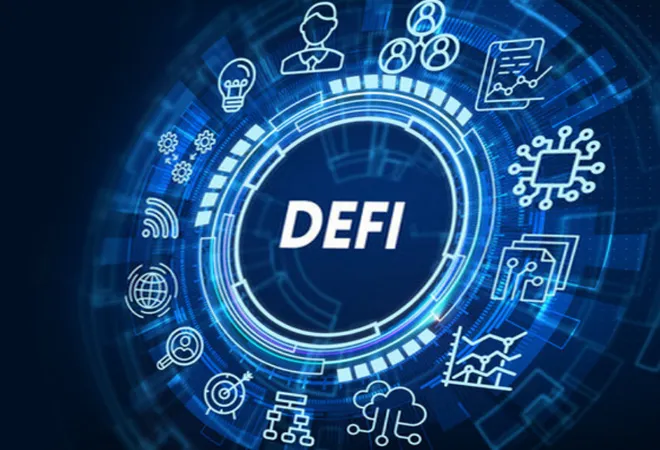
DeFi, or decentralised finance, has increasingly gained traction in the world of blockchain and cryptocurrency. Drawing inspiration from the technology that underpins Bitcoin, DeFi aims to disrupt traditional financial intermediaries by allowing for more direct control over one's assets. By leveraging blockchain's ability to maintain a decentralised ledger of transactions, DeFi offers a new way of conducting complex financial transactions by not limiting the constraints of centralised systems or human intermediaries.
As the DeFi industry continues to expand globally, the lack of a unified approach to its regulation has created uncertainty and challenges. Despite the prevailing challenges, India may be in a prime position to take the lead in DeFi regulation. India has shown an increasing
interest in blockchain technology and digital assets, with regulators taking a proactive approach to understand and manage industry risks. India's large unbanked population and its need for greater financial inclusion, make DeFi an attractive option. If India can strike the right balance between innovation and oversight, it could pave the way for a regulatory framework that other countries could follow.
DeFi Vs CeFi
DeFi and CeFi (centralised finance) are different approaches to conducting financial transactions. DeFi harnesses the power of blockchain technology to build a financial system that operates without intermediaries, such as banks or financial institutions. This model is based on the core principles of decentralisation, transparency, and immutability, and aims to create a more open and inclusive financial system that is accessible to everyone. By leveraging decentralised networks and protocols, DeFi applications provide users with access to wide-ranging financial services, including lending, borrowing, trading, and investing.
DeFi harnesses the power of blockchain technology to build a financial system that operates without intermediaries, such as banks or financial institutions.
On the other hand, CeFi is based on the traditional financial model in which intermediaries such as banks, financial institutions, and regulators play a central role in facilitating financial transactions. This model is typically centralised and controlled by a single entity, limiting the speed, accessibility, and flexibility of financial services.
The main difference between DeFi and CeFi lies within the level of centralisation and control involved in each model. While DeFi seeks to build a more open and decentralised financial system, CeFi represents the traditional approach in which intermediaries are the gatekeepers of financial transactions.
Building Consensus
In the ever-evolving world of DeFi, there seems to be ambiguity rather than a lack of agreement about regulation among key global stakeholders. The United States (US) and France have recently attempted to analyse the scope and impact, and possible hazards of this burgeoning space.
The US Department of the Treasury conducted a
risk assessment recently on the decentralised finance (DeFi) industry, which highlighted the challenges. The report raised concerns about DeFi projects that fail to comply with know-your-customer and anti-money laundering (KYC/AML) regulations and the susceptibility of such projects to theft. It cautions that the transparent and open-source nature of DeFi projects could be exploited by attackers who seek to take advantage of potential vulnerabilities. Therefore, the report underscores the importance of identifying and addressing potential risks and vulnerabilities in open-source code, particularly those lacking a mechanism for quick alteration or deactivation in the event of a critical exploit.
The proposed regulations aim to be tailored to the specific features of DeFi and factor in its innovative capabilities in disintermediated finance.
Similarly, a recent Bank of France
discussion paper delves into various regulatory options to address the risks inherent in decentralised finance (DeFi). The proposed regulations aim to be tailored to the specific features of DeFi and factor in its innovative capabilities in disintermediated finance. To ensure the security of blockchain infrastructures, the report suggests either certifying public blockchains based on minimum security standards, or shifting financial functions to private blockchains overseen by trusted players.
The Bank of France reflects on the nuances regulators must strike in regulating DeFi while balancing the need for innovation with the importance of ensuring security and minimising risks. It highlights the importance of safeguarding DeFi platforms while encouraging continued growth and development in this space.
In essence, both reports speak about the precarious nature of the DeFi industry, one that demands constant vigilance and a commitment to risk mitigation. They underscore the need to strike a delicate balance between innovation and compliance, and the importance of fostering an environment that promotes responsible development.
India’s DeFi Journey
The task of regulating decentralised finance in India is a
challenging one. The Reserve Bank of India (RBI) has expressed concerns over cryptocurrencies in the past, citing risks to financial stability. It has also taken a strong stance against unregulated digital assets, arguing that they pose a significant threat to the financial system. Moreover, RBI’s latest Financial Stability
Report emphasises the high volatility of crypto assets. Under its G20 presidency, India is seeking to develop a global regulatory framework that could include measures like prohibiting unbacked crypto assets, stablecoins, and DeFi. Nevertheless, it remains to be seen how India can effectively regulate DeFi, given its decentralised nature.
One of the foremost hurdles that must be addressed is the need for DeFi to adhere to anti-money laundering (AML) and countering financing of terrorism (CFT) regulations
With no global consensus on DeFi regulation, the US and France have got the ball rolling, and it is India’s turn to follow suit. The common thread in the risk assessments conducted by the US and France is developing security standards, which is an ideal starting point for Indian regulators. One of the foremost hurdles that must be addressed is the need for DeFi to adhere to anti-money laundering (AML) and countering financing of terrorism (CFT) regulations. These regulations are designed to thwart financial crimes such as money laundering and terrorist financing by requiring financial institutions to identify and verify the identities of their customers and report any suspicious transactions to the appropriate authorities. To mitigate the risk of such illicit activities, Indian regulators must prioritise the implementation of AML and combating the financing of terrorism (CFT) regulations for DeFi platforms. This will entail the creation of a framework that mandates DeFi platforms to incorporate robust KYC (know your customer) procedures, closely monitor and report any suspicious transactions, and ensure compliance with other pertinent regulations.
Such regulations are not new to Indian stakeholders. On 7 March, the federal government issued a
gazette notice mandating intermediaries and crypto exchanges dealing with virtual digital assets (VDA) to conduct KYC verifications on their users and customers. These intermediaries and exchanges are obligated to inform the Financial Intelligence Unit India (FIU-IND) of any dubious activity.
The regulation of DeFi in India is a formidable undertaking that will require the concerted efforts of regulators and industry stakeholders alike. Striking a balance between innovation and compliance will be paramount, as will the need to uphold the highest standards of integrity and ethical conduct. Having carved a leadership position in the rollout of digital public goods, such as Aadhar and UPI, India’s success in DeFi regulation will set a global template.
Sauradeep Bag, Associate Fellow, Observer Research Foundation
The views expressed above belong to the author(s). ORF research and analyses now available on Telegram! Click here to access our curated content — blogs, longforms and interviews.



 DeFi, or decentralised finance, has increasingly gained traction in the world of blockchain and cryptocurrency. Drawing inspiration from the technology that underpins Bitcoin, DeFi aims to disrupt traditional financial intermediaries by allowing for more direct control over one's assets. By leveraging blockchain's ability to maintain a decentralised ledger of transactions, DeFi offers a new way of conducting complex financial transactions by not limiting the constraints of centralised systems or human intermediaries.
As the DeFi industry continues to expand globally, the lack of a unified approach to its regulation has created uncertainty and challenges. Despite the prevailing challenges, India may be in a prime position to take the lead in DeFi regulation. India has shown an increasing
DeFi, or decentralised finance, has increasingly gained traction in the world of blockchain and cryptocurrency. Drawing inspiration from the technology that underpins Bitcoin, DeFi aims to disrupt traditional financial intermediaries by allowing for more direct control over one's assets. By leveraging blockchain's ability to maintain a decentralised ledger of transactions, DeFi offers a new way of conducting complex financial transactions by not limiting the constraints of centralised systems or human intermediaries.
As the DeFi industry continues to expand globally, the lack of a unified approach to its regulation has created uncertainty and challenges. Despite the prevailing challenges, India may be in a prime position to take the lead in DeFi regulation. India has shown an increasing  PREV
PREV


